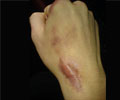Antibodies to speed up healing of chronic wounds have been developed by Australian researchers. The breakthrough is good news to burns victims, diabetes sufferers and the elderly.
Antibodies to speed up healing of chronic wounds have been developed by Australian researchers. The breakthrough is good news to burns victims, diabetes sufferers and the elderly.
Associate Professor Allison Cowin, from the Women's and Children's Health Research Institute and the University of Adelaide's Discipline of Surgery have found that a specific protein known as Flightless I (Flii) restricts wound healing. The Adelaide researchers have been able to use antibodies to suppress the Flii protein, thereby promoting wound healing."Improving wound healing has the potential to benefit a large proportion of the Australian community, particularly the aged, the obese and patients with diabetes, all of whom are at increased risk of developing chronic, non-healing ulcers," Associate Professor Cowin says.
"This new technology will also have applications for treating burn injuries and surgical wounds," she says.
"When a wound heals faster, the body is better protected against blood loss and infection. But in its haste to heal, the body also creates scar tissue that can cause chronic pain, deformity and disability.
"The medical need for improved wound healing will only expand as our population ages and the diabetic epidemic grows."
Ms. Cowin says further research into the treatment is needed and it could be as many as 10 years before such a treatment is available to the public.
Advertisement
Advertisement
GPL










